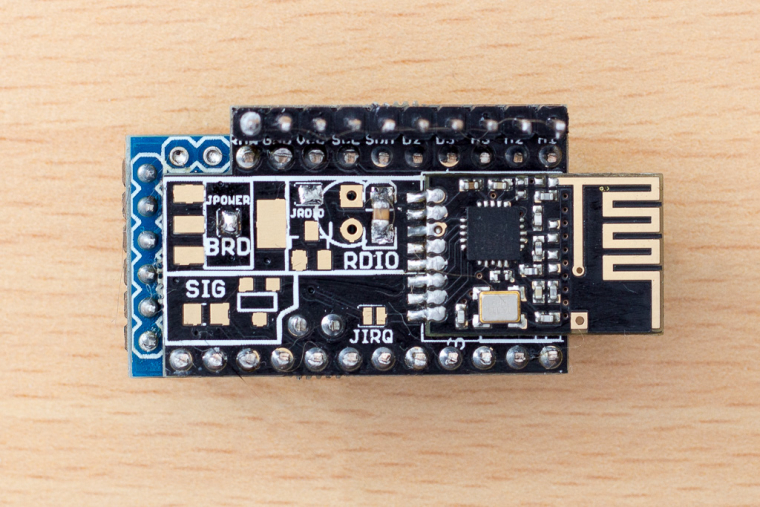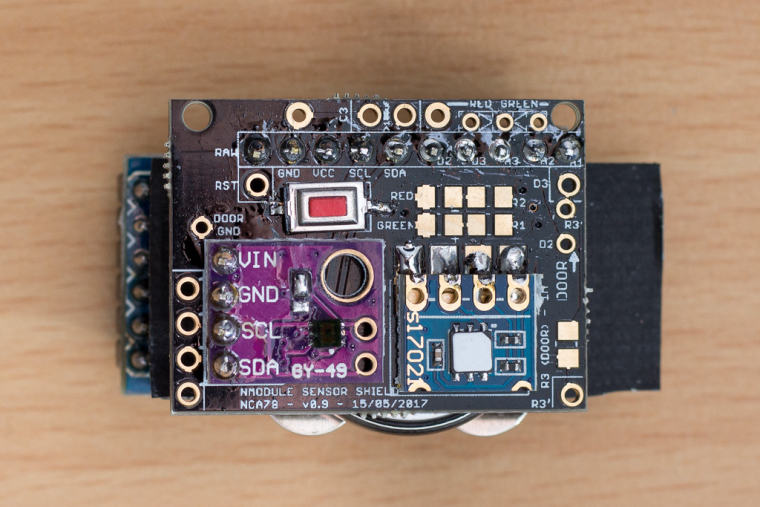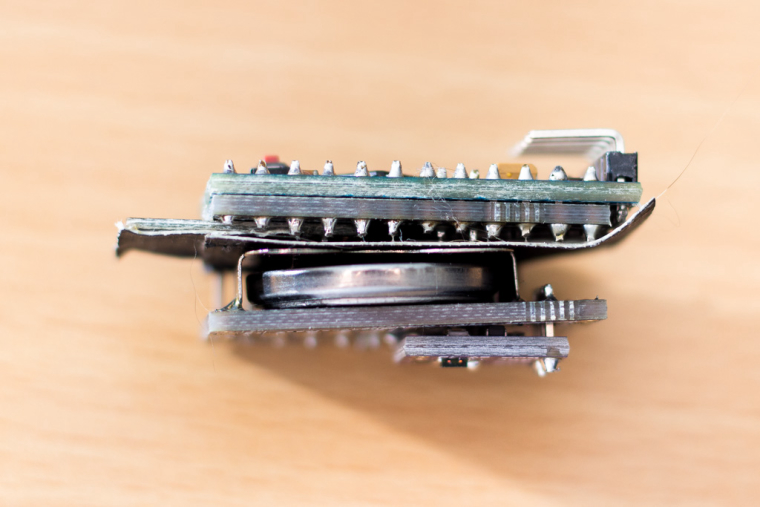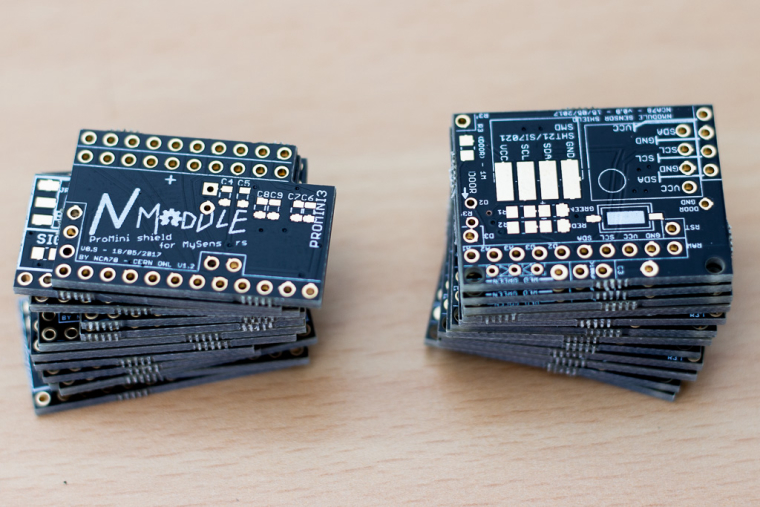💬 NModule
-
checked between the pins, no radio pins are touching each other. Those hairs er most likely from the cat, got them cleaned after the photo.
I will try to make one more module in a few days and test.But to confirm, for the simplest module I need >4.7uF cap, pro mini and the radio, two jumpers (jpower and jrdio) and some mock sketch, and it should all work?
Have I missed some other jumper or resistor or some other component maybe?@dakipro no you're not missing anything now.
Cap is not even necessary at the moment don't worry about it.Problem is connection with radio so you have to make sure :
- VCC and GND pins of radio are correctly connected (seems it's done)
- SPI pins are correctly connected to the radio, check the "connecting the radio" page for the pinout on the pro mini, and radio module pinout. Then check continuity from radio connector to matching pin on radio side, you might have a soldering problem.
-
@dakipro you can also check the continuity between adjacents pins of the radio modules, it should be in MOmhs, if lower that could be a reason for failing communication too.
@dakipro you can also check the continuity between adjacents pins of the radio modules, it should be in MOmhs, if lower that could be a reason for failing communication too.
Just reading on computer instead of phone and I see you did it already, so except a connection problem with the SPI pins I don't see any reason for failure...
-
Thanks :)
Then I guess all that is left is to motivate you to start OTA and improve it (finetune) it to nmodule :)
I used it for regular modules and it is really practical, but I never had much luck with optimizing modules for battery performance. I would get a half year/year with 2 AA batteries, which is not that good comparing with your tweaks for CR battery.Keep us updated on other modules, people are waiting for your tests to start ordering :)
Thanks :)
Then I guess all that is left is to motivate you to start OTA and improve it (finetune) it to nmodule :)Just did OTA on a main powered NModule with MYSBootloader and it worked like a charm.
I will test with a battery (CR123) module at 1MHz now, and post a tutorial later. -
Thanks :)
Then I guess all that is left is to motivate you to start OTA and improve it (finetune) it to nmodule :)Just did OTA on a main powered NModule with MYSBootloader and it worked like a charm.
I will test with a battery (CR123) module at 1MHz now, and post a tutorial later. -
IT WORKS!! Life is worth living again...
I've assembled now fourth module and it works, only different thing I did is that I have soldered the radio and power jumpers before connecting the module together. It could be that without jumpers essential component of all electronics (white smoke) gets out of the radio, not sure what happened. But it works!I was struggling a bit to figure out all components needed and all the steps, it might be helpful to have a "short guide", this is for my own reference of what I did in order to get CR2032 module for using with TempHumDoor shield:
Components needed [nModule]: pro mini, radio, nmodule board, 1 capacitor for radio larger then 4.7uf (I har only 10uf, I have ordered 47uf for future modules).
Assembling process
- Burn 1mhz bootloader on pro mini
- solder two jumpers for jpower and jrdio
- solder the radio to the board
- Control that there is no connection between the radio pins, resistance is at least above 200Kohm (don't skip this part thinking it cannot happen to you, it will happen)
- Solder >4.7uf (f.eks. 10ud) smd.
- Solder all legs to arduino (except last two RXI and TX0, you will see them missing when you align nModule)
- Take off the plastic from the legs, before you solder it to the radio (do this BEFORE you solder it to the board)
- Solder arduino to nModule board
- Since the capacitor is very small, just check if there is no short between plus and minus (vcc and gnd) pins, as somehow I managed to short them on one module, it turned out that one of the caps was shorting it, probably by overhitting or something.
Upload mockMySensors sketch and check that node works properly (spare yourself a trouble, no point continuing further if this doesn't work) By this point you should have node looking like (better then) this:

TempHumidityLightDoor shield components: SMD SI7021 for temperature and humidity and a MAX44009 for light, two capacitors larger then 100uf (I used two of 100uf, waiting for 220 to come). And the work so far.
You basically solder these three/four components and the battery holder as described on the shield here https://www.openhardware.io/view/398/NModule-Temperature-Humidity-Light-Door-sensor-shield
I didn't yet solder LEDs, but they are accessible after assembling the module.
Then it looks like this:

Now that nModule #1 is completed, you continue with other modules

-
If the "power" board is used, shall I keep the voltage regulator on Arduino? Without it, i think powering the board from RAW pin will not work.
-
If the "power" board is used, shall I keep the voltage regulator on Arduino? Without it, i think powering the board from RAW pin will not work.
@Haozhi-Wang it will depend how you connect things on the "power" board and/or what regulators you use on the NModule board.
There are 2 reasons to remove the regulator :- save energy if you are running on battery, it's not a big waste so if you are using CR123 or AAA you can keep it so it's possible for you to power from RAW with a higher voltage
- when powering from main, allow higher RAW voltage with a better voltage regulator on the NModule or the "power" board (on promini clones usually the maximum voltage is usually 9V)
There is a connection between the RAW pin of the promini (on the long side) and the RAW on the "power board", so whether it will work if you use a regulator on the "power" board and remove regulator on the promini will depend on the promini you use, if there is a track betwenn the 2 RAW pins or if it goes through the regulator.
I hope it answers your question, if not please describe more clearly what sensor you are building, with what power source and why you want to power it from RAW.
-
I love those shields... to bad they dont use MysX connector ;) Any thoughts about 2.0 rev?
-
I love those shields... to bad they dont use MysX connector ;) Any thoughts about 2.0 rev?
@sundberg84 I'm working on it :)
-
@Nca78 Thanks you for you detailed answer.
The power source i am going to use is a CR2032. My bad, I overlooked the three RAW, VCC and GND connectors (yellow) on the power board site.
For my case, i think shout circuit of JPOWER will be a even better solution -
@Nca78 Thanks you for you detailed answer.
The power source i am going to use is a CR2032. My bad, I overlooked the three RAW, VCC and GND connectors (yellow) on the power board site.
For my case, i think shout circuit of JPOWER will be a even better solution@Haozhi-Wang said in 💬 NModule:
@Nca78 Thanks you for you detailed answer.
The power source i am going to use is a CR2032.
Yes, for that case you need to short JPOWER and JBRD.
And don't forget to double check your USB adapter every time you connect it to your computer, to make sure you have selected 3.3V, else you will fry your radio with 5V. -
Hi there!
I've ordered 10 PCBs from iTEAD, so now... I'm plenty of them to do some tests.
Can you confirm these Minis are ok?
https://www.aliexpress.com/item/10pcs-ATMEGA328P-Pro-Mini-328-Mini-ATMEGA328-3-3V-16-MHz-for-Arduino-3-3V-16/32784455996.html?spm=a2g0s.13010208.99999999.271.swhWGMBtw, I have some battery boosters, I have used them already with success on breadboard. Have you got any experience about it? Do you think the PCB is hackable to integrate it?
Thanks!
-
Hi there!
I've ordered 10 PCBs from iTEAD, so now... I'm plenty of them to do some tests.
Can you confirm these Minis are ok?
https://www.aliexpress.com/item/10pcs-ATMEGA328P-Pro-Mini-328-Mini-ATMEGA328-3-3V-16-MHz-for-Arduino-3-3V-16/32784455996.html?spm=a2g0s.13010208.99999999.271.swhWGMBtw, I have some battery boosters, I have used them already with success on breadboard. Have you got any experience about it? Do you think the PCB is hackable to integrate it?
Thanks!
Can you confirm these Minis are ok?
https://www.aliexpress.com/item/10pcs-ATMEGA328P-Pro-Mini-328-Mini-ATMEGA328-3-3V-16-MHz-for-Arduino-3-3V-16/32784455996.html?spm=a2g0s.13010208.99999999.271.swhWGMYes they are ok, they seem to use the Sparkfun layout if I believe the reset button and the position of the A6/A7 pins. I use the boards with a smaller, rectangular reset button on my NModule PCB. The only problem I ever had with "different" ProMini board was the connection between the vcc of the programming header was cut when removing the voltage regulator so board was not powered anymore when using FTDI adapter.
Btw, I have some battery boosters, I have used them already with success on breadboard. Have you got any experience about it? Do you think the PCB is hackable to integrate it?
No, if you use a booster you need some extra caps for filtering the output, and a voltage divider to measure battery voltage, there's no space for that on NModule. I made NModule to have a compact "all included" board, so it's made to use low power sensors, that can run at low voltage so you don't need a booster.
If you really want to use a booster try EasyPCB. -
-
-
or have battery measurements
You will have battery measurement, because you will power the atmega with the battery directly so it's possible to read Vcc.
When you use a booster Vcc is always the same so you need a voltage divider on the battery to know it's voltage.Sorry, n00b here! :( Thanks again, nca!
-
or have battery measurements
You will have battery measurement, because you will power the atmega with the battery directly so it's possible to read Vcc.
When you use a booster Vcc is always the same so you need a voltage divider on the battery to know it's voltage.Sorry, n00b here! :( Thanks again, nca!
